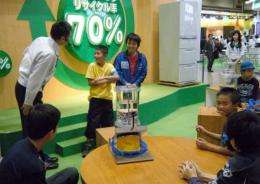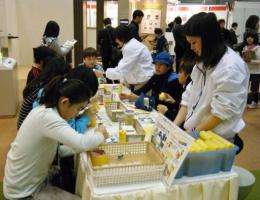Japan eco-fair seeks to reach next generation

Japanese schoolchildren in yellow scarves, blue hats and red caps buzzed through an eco-products fair -- a green show-and-tell for high tech companies seeking to enthuse a new generation.
Educational workshops and corporate booths at Eco-Products 2010, one of the country's largest environmental exhibitions, last week showed off ways to save and sustain the planet that these youngsters will soon inherit.
"Do you know how we can separate different plastics used in a refrigerator after it is crushed?" asked an engineer from Mitsubishi Electric, one of more than 700 exhibitors that filled the large trade fair hall.
A lot of blank faces stared back -- but soon the children tried the process for themselves, shaking up clear plastic bottles filled with water and a mixture of scraps of different plastic components.
"If we put the plastic scraps in the water, some float and others sink, so you can make an initial separation," said the engineer, explaining the concept behind Mitsubishi Electric's industrial-scale recycling processes.
In the next stage of the experiment, the children spun the remaining scraps in a second, dry bottle, with some bits sticking to the side because of static electricity and others sliding to the bottom.
The theme of the exhibition -- held at Tokyo Big Sight, a futuristic harbourside conference centre topped by a giant inverted pyramid -- was "Green x Clean Revolution! Expand the power to connect lives to the world".
The fair drew a record of more than 180,000 visitors in three days, including some 20,000 students from in and around Tokyo, organisers said.
To stay true to its green message, the fair was powered by wind, solar and biomass energy sources, and paper entry tickets were replaced with bar-codes emailed to guests' cellphones and scanned on the way into the fair.
On display were eco-products from home appliances to hybrid and electric cars, but also energy and chemical applications, and sustainable and non-polluting methods of making paper and other materials.
Also pushing eco-education with games and quizzes were other electronics giants such as Sony, Fujitsu and Toshiba, which showed off green products from mini-wind farms to solar-powered toy cars.
Many of the stands also featured manga and anime cartoons -- including hugely popular "future cat" Doraemon -- as well as pictures and pronunciation guides for tech jargon to teach their impressionable young audience, many of whom embraced the message.

"The Earth is being degraded and we must fix it," said one of the students, nine-year-old Ryunosuke Takagi.
"Coming here, I can really learn about new energy sources, and I am really amazed at the techniques that have been devised to better preserve the environment. It's frankly very interesting," he said.
Nature, the need to preserve it and, occasionally, its destructive wrath, are ever-present in Japan -- a volcanic island-nation that is regularly battered by earthquakes, tsunamis and typhoons.
With precious few energy and mineral resources of its own, Japan was hard hit by the 1973 oil crisis, which sent its companies and citizens scrambling for ways to save on oil, water and electricity.
They have helped make Japan a leader in green technology -- from hybrid and electric cars, to light emitting diodes, solar cells, new power systems, and even water-saving electronically-controlled toilets.
Companies have found that ecology sells.
"Our goal is to sell products that are less polluting -- in the production phase, during use and when they are recycled," said Machiko Miyai, director of Panasonic's green electronics and appliances division.
Another student, Genki Watanabe, 10, said he was captivated by the cutting-edge environmental technologies: "It's awfully nice to be here, we are taught so many things. I want to come every year."
(c) 2010 AFP



















